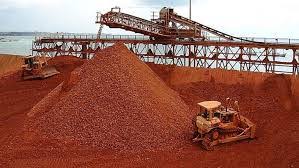Ghana is set to commence teh construction of its maiden bauxite refinery by this October in a move to add value to its mineral resources and boost the national economy.
Officials said during a tour by the Western North Regional Minister, Wilberforce Bentum that a domestic refinery would ensure that even ore below the current export-grade threshold—rejected by foreign off-takers—can be processed locally, increasing the economic value of Ghana’s bauxite.
Bentum embarked on the tour to familiarise himself with operations at the Awaso mine, which has previously seen worker agitations over poor conditions of service.
According to reporter Nicholas Osei-Wusu of the Ghana Broadcasting Corporation (GBC) who reported on teh tour, the “Ghana Bauxite Company has secured a site measuring approximately 3,000 square kilometres at Awaso for the refinery. The company is currently awaiting the Lands Commission’s Valuation Department report to determine fair compensation for affected farmers and other landholders.”
Already, the Ghana Bauxite Company has secured the location of the refinery measuring about three thousand square kilometres at Awaso as the company and awaits the Report of the Valuation Department of the Lands Commission to determine the most appropriate compensation package for the affected farmers and other surface right holders.
General Manager of the Ghana Bauxite Company, Alexander Gyedu, made the disclosure during a familiarisation tour of the mine by the Western North Regional Minister, Wilberforce Bentum.
“The cost will not deter us from investing in the refinery. We’re focused and determined to add value to the raw Bauxite that we’re exporting. Because some of the areas that we’re mining, if we’d a refinery, we could do it and add value to what we’re getting. Some of the areas we’re mining, the quality is low and per the export contract we’ve with the officer taker, if it falls below 48 percent, it’s a total rejection but if we’d the refinery, 48% of aluminium content can still be refined,” the General Manager explained.
He toured the mine site, including the main crusher and a C4 2.2-kilometre conveyor belt that moves ore to the washing plant, and also visited the haulage site.
During the tour, it emerged that employee remuneration has seen significant improvements. Contract workers now have fixed terms with better compensation, and the company offers paid internships to students.
It was also revealed that the company has transitioned from the traditional “drill and blast” mining method to surface mining, a safer and more environmentally friendly approach for surrounding communities.
Since the cessation of rail haulage in 2011, all bauxite transportation from Awaso to the Takoradi Port has been by road, a method fraught with logistical challenges.
At a meeting during the tour, Bentum described the company’s transformation as a testament to the capabilities of Ghanaian professionals when given the right environment.
He pledged the government’s unflinching support to enable the company succeed and contribute to the economy.
“No doubt that with this able team, we’re seeing this success that you’re chalking. I think it’s very very interesting. All that we, as a government, because I represent President John Dramani Mahama in the Western North region, and I I want to assure you is that, government will give you all the support along the way,”Bentum said.
He added, “And, also with the able leadership of Honourable Armah Kofi Buah, our Lands and Natural Resources Minister, we’ll be with you every step of the way. So we urge you to continue with the CSR you’re doing already for the communities.”
Bentum said the refinery project has enormous potential to enhance value addition in Ghana’s bauxite sector and boost export revenue.
Bauxite mining at Awaso, now located in the Western North Region, has been ongoing for nearly 80 years. Until 2022, the mine was managed by foreign interests and management.
The concession spans 35.5 square kilometres—just 0.4 percent of the region’s land area—and runs through areas such as Sefwi Bibiani, Anwiaso and Bekwai. The mining lease covers a 35-year period, and the company remains Ghana’s only active bauxite producer.
Under existing export agreements, bauxite with less than 48 percent aluminium content is automatically rejected, leading to considerable waste.
Since becoming wholly Ghanaian-owned and managed in 2022, the company has significantly expanded its workforce—from 483 (including expatriates) to more than 1,300—and invested more than GH¢122 million into operations.

